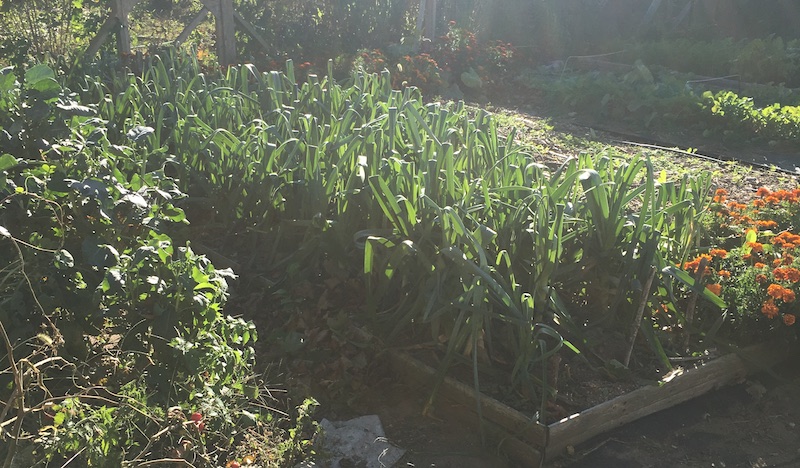The Diversity of Life
I will argue that every scrap of biological diversity is priceless, to be learned and cherished, and never to be surrendered without a struggle.
– E.O. Wilson

Leeks. In the ground.
I have a variety of leek in my home garden that came about through my incompetence as a gardener. Or possibly due to being sleep-deprived from becoming a new father. Either way, it came about by chance. I’d like to be able to claim otherwise.
A few years back, I planted two leek varieties in seed trays. Then got worried they were dying when they got scorched in a cold frame one sunny day. So I planted a third variety. As it turned out, everything survived and the seedlings were unceremoniously dumped into a bed in no particular order and promptly forgotten about. <Cue sounds of baby screaming.>
Time passes. We harvest some leeks. We forget about others. More time passes. Snow arrives and then melts. The baby starts walking. In spring we discover some survivors from last year straining for the light in the bed. But, turns out, a toddler can be as much work as a baby so they are again forgotten about. In obscurity, they grow strong and set seed heads. Each seed a patchwork of diverse genes from the pool of those three varieties we planted more than a year ago. And I think: maybe I should save these seeds and grow them next year?
We’re now into our third year of saving the seeds from the leeks. Each year choosing for the strongest winter survivors. We probably (maybe?) added some more varieties into the mix in the interim, but our notes are poor and we now have two children so who can be sure? What we can be sure of is that we now have a leek with a broad diversity of genes that make it a good fit for our soil in our climate.
I was thinking about this the other day when the garden committee met to discuss our plans. Folks had so many ideas for how this garden could flourish. We could have many individual gardeners planting and sharing ideas. We could build areas for school children or other community members to stop by and learn, sit, and take it all in. We could have workshops and events. We could be a hub for change beyond our fenced borders. Who knows? (if you have ideas, please post a public comment)
The one certainty is that all of the plans we have will be at their strongest in our community if we draw from a diverse pool of participants. We need garden-curious folks with a variety of ages, genders, races, cultures, socioeconomic means, and experience levels if this garden is to thrive in our community. We are honoring a deep history at this property, but also need to look to the needs of the present and the future. As in botany, diversity allows us to take the models from the past and strive towards adapting and flourishing in the world to come.
In the next few weeks, the committee will reach out to community groups to find out who wants to be involved and in what way. These voices will begin to build the diversity that the garden needs. We are also taking public comment so please add your voice.
May this garden be like my leeks. But maybe a little more intentional.